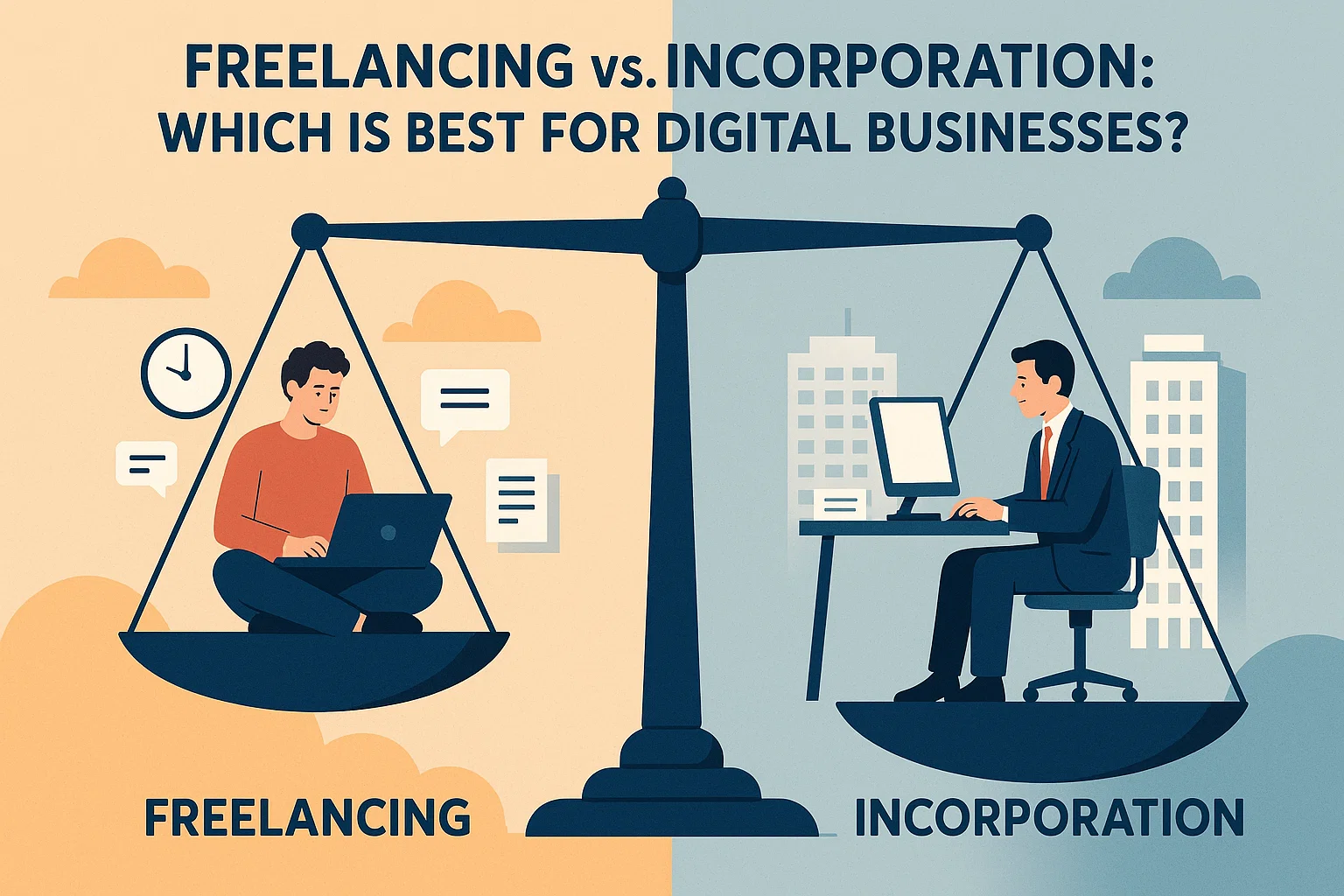Freelancing vs. Incorporation: Which Is Best for Digital Businesses?

Freelancing vs. Incorporation: Which Is Best for Digital Businesses?
A comprehensive 2025 guide comparing freelancing and incorporation options for digital entrepreneurs and startups. Understand the benefits, drawbacks, tax implications, legal protections, and compliance requirements to choose the best model for your digital business—optimized with high CPC keywords like freelancing vs incorporation 2025, digital business models, startup legal structures, and online business incorporation for strong SEO and eCPM performance.
Table of Contents
- Introduction: Why Choosing the Right Business Structure Matters
- Freelancing Overview: Flexibility and Simplicity
- Incorporation Overview: Legal Identity and Protection
- Tax Implications of Freelancing vs Incorporation
- Liability and Legal Protections Compared
- Compliance and Regulatory Differences
- Access to Funding and Business Growth Potential
- Administrative Burden and Costs
- Factors to Consider When Choosing Your Business Model
- Case Studies: Real-World Examples
- Common Mistakes in Choosing Business Structures
- Frequently Asked Questions
- Conclusion: Making the Best Choice for Your Digital Business
Introduction: Why Choosing the Right Business Structure Matters
Whether you"re launching a solo digital freelancing career or scaling a tech startup, your choice between freelancing and incorporation profoundly impacts your taxes, legal risk, funding opportunities, and long-term growth. In 2025, the evolving digital economy demands that entrepreneurs understand these differences to optimize their business structure in alignment with their goals.
Freelancing Overview: Flexibility and Simplicity
Freelancing offers unmatched flexibility with minimal setup and administrative costs. Digital professionals can operate as sole proprietors or independent contractors without formal business registration (depending on jurisdiction) and usually have simpler tax filing requirements.
- Ideal for solo operators or early-stage digital entrepreneurs.
- No need to register a formal business entity in many cases.
- Flexible schedules, client-based project work.
- Directly responsible for reporting income and expenses on personal tax returns.
- Limited ability to raise external funding.
Incorporation Overview: Legal Identity and Protection
Incorporation creates a distinct legal entity—such as an LLC, Private Limited Company, or Corporation—providing liability protection and greater credibility with clients, partners, and investors.
- Separates personal assets from business liabilities.
- Enables easier access to loans, venture capital, and grants.
- Provides tax planning opportunities and potential deductions.
- Requires formal registration, annual filings, and compliance with corporate laws.
- Suitable for scaling digital startups or businesses with multiple employees.
Tax Implications of Freelancing vs Incorporation
Understanding tax obligations is essential:
- Freelancers: Typically pay self-employment taxes and report income on personal returns; fewer deductible expenses but simpler filing.
- Incorporated Businesses: Can choose tax structures (pass-through, S Corp, C Corp) optimizing tax rates and benefits. Entitled to more deductions (business expenses, health insurance, retirement plans).
- Separate accounting may be required for incorporated businesses.
Liability and Legal Protections Compared
- Freelancers have unlimited personal liability for business debts and legal claims.
- Incorporation offers limited liability protection, shielding personal assets from business risks.
- Incorporated entities can enter contracts, hire employees, and own property separately from owners.
Compliance and Regulatory Differences
- Freelancers face minimal regulatory requirements but must comply with tax laws and local business licenses where applicable.
- Corporations and LLCs have ongoing obligations: annual reports, corporate tax filings, possible audits, and governance formalities.
Access to Funding and Business Growth Potential
- Incorporated businesses can raise capital from investors, apply for business loans, and qualify for grants more easily.
- Freelancers largely rely on personal funds or client payments for growth.
Administrative Burden and Costs
- Freelancers manage simpler bookkeeping and tax reporting, often with low to no setup costs.
- Incorporation requires paying registration fees, maintaining corporate records, filing taxes separately, and possibly hiring accountants or corporate service providers.
Factors to Consider When Choosing Your Business Model
- Scale and complexity of your business operations.
- Risk tolerance and need for liability protection.
- Growth ambitions and capital requirements.
- Tax efficiency and administrative capacity.
- Geographic location and local legal requirements.
Case Studies: Real-World Examples
Explore how digital entrepreneurs transitioned from freelancing to incorporation and the impact on their business growth, taxes, and legal protection (case studies to be customized based on user specifics).
Common Mistakes in Choosing Business Structures
- Delaying incorporation for too long and exposing personal assets to risk.
- Incorporating prematurely without understanding added costs.
- Choosing complex entity types without consulting professionals.
- Ignoring local licensing or tax registration requirements.
Frequently Asked Questions
Q1: Can I start as a freelancer and incorporate later?
Yes, many entrepreneurs begin freelancing and incorporate once their business grows or requires legal protection.
Q2: What are the common business entities for digital startups?
LLCs, S Corporations, and Private Limited Companies are popular due to liability protection and tax benefits.
Q3: How much does incorporation typically cost?
Costs vary by jurisdiction but generally include registration fees, ongoing compliance costs, and possible accounting services.
Q4: Does incorporation automatically reduce my taxes?
Not necessarily; tax benefits depend on your business income, deductions, and elected tax status.
Q5: Should I hire a lawyer or accountant before incorporating?
Consulting professionals is highly recommended to select the most beneficial structure and ensure regulatory compliance.
Conclusion: Making the Best Choice for Your Digital Business
Choosing between freelancing and incorporation is a foundational decision that affects your digital business’s legal standing, tax liabilities, growth potential, and risk exposure. Evaluate your current needs, anticipate business growth, and consult professionals to select the structure that best aligns with your vision. Whether you prefer the simplicity of freelancing or the protections and opportunities of incorporation, making an informed choice in 2025 positions your digital enterprise for success.
Take the next step—evaluate your business goals, research local laws, and plan your business structure thoughtfully to thrive in the evolving digital economy.
Comments (3)